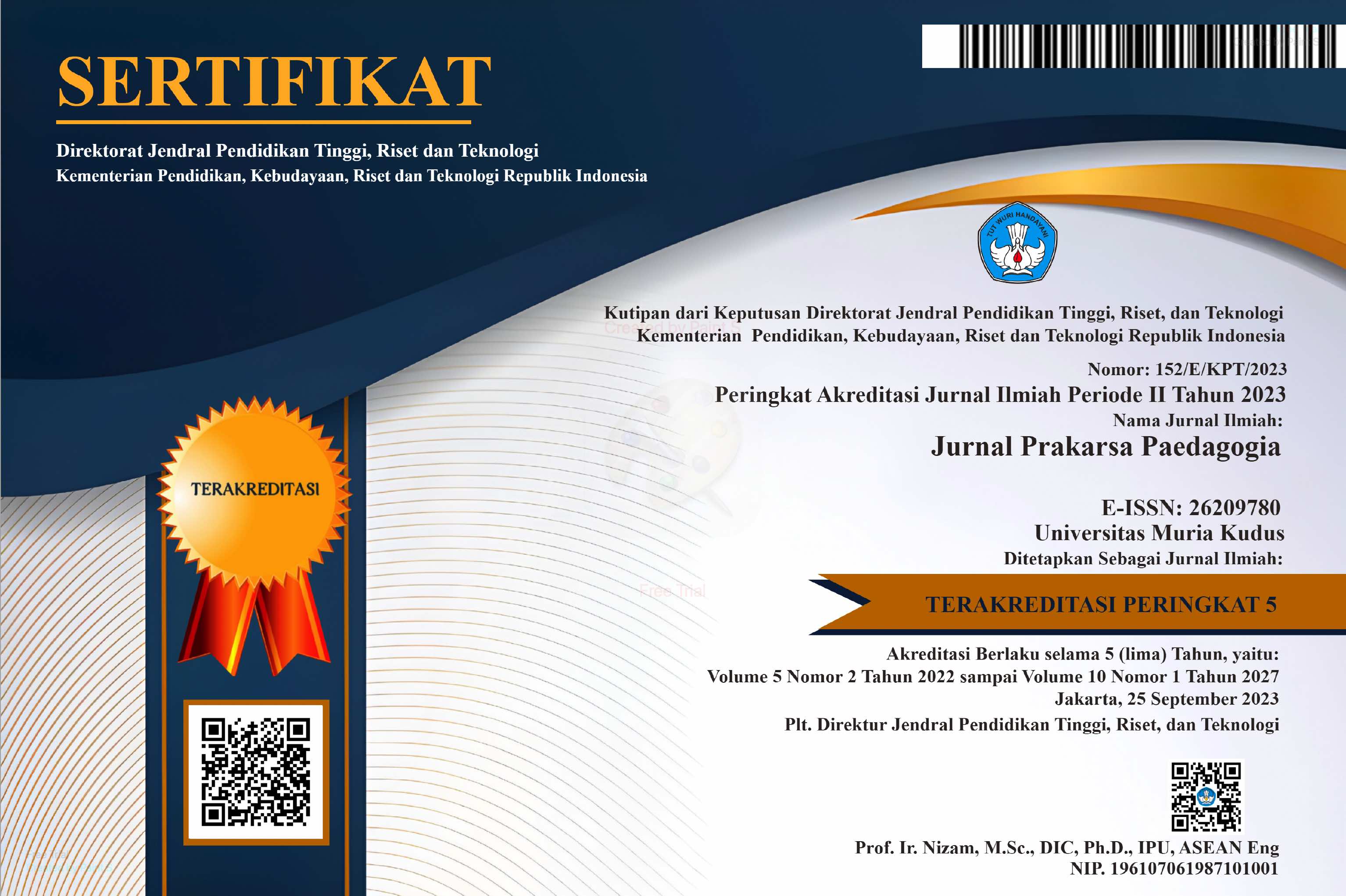Pengaruh Model Pembelajaran Inquiry Terhadap Hasil Belajar Pendidikan Kesehatan Sekolah Di Prodi PJKR UPMI
Abstract
Keywords
Full Text:
PDF (Bahasa Indonesia)References
Alvarado, A., & Solomon, C. (2020). Inquiry as a teaching strategy in mathematics education. Mathematics Education Research Journal, 32(1), 98-115. https://doi.org/10.1007/s13394-019-00324-5
Boda, L., & Brown, A. (2020). Contextualized inquiry learning in STEM education: Fostering student engagement and higher-order thinking. International Journal of STEM Education, 7(1), 25. https://doi.org/10.1186/s40594-020-00218-4
Basak, S. K., & Mathew, P. (2020). The effectiveness of inquiry-based teaching methods in science education. Science Education International, 31(1), 29-45. https://www.icse.org
Blanchard, M. R., Southerland, S. A., & Osbourne, J. (2021). Designing effective inquiry-based learning experiences in the science classroom. International Journal of Science Education, 43(5), 861-878. https://doi.org/10.1080/09500693.2021.1890193
Cheng, H., & Lee, C. (2020). Integrating inquiry-based learning in classroom teaching: Impacts on student performance in secondary education. Journal of Educational Technology Systems, 48(3), 323-336. https://doi.org/10.1177/0047239520908480
Brown, S., & Green, T. (2021). Fostering inquiry in the classroom: A review of practices and approaches. The Journal of Educational Research, 114(4), 422-432. https://doi.org/10.1080/00220671.2021.1889087
Dori, Y. J., & Belcher, J. (2021). Student-centered inquiry learning in higher education: A global perspective. Higher Education, 82(2), 365-385. https://doi.org/10.1007/s10734-020-00618-
Duschl, R. A., & Bybee, R. W. (2020). The role of inquiry in science education: A framework for effective teaching. Science Education Review, 15(3), 63-79. https://www.sciencedirect.com/science/article/pii/S0361476X18300088
Fischer, H. E., & Kunter, M. (2021). Inquiry-based learning in practice: A guide for educators. Journal of Educational Psychology, 112(6), 1224–1235. https://doi.org/10.1037/edu0000407
Furtak, E. M., Seidel, T., Iverson, H., & Briggs, D. C. (2019). Experimental studies of inquiry-based science teaching: A meta-analysis. Review of Educational Research, 82(3), 300–329. https://doi.org/10.3102/0034654311432974
Grant, C., & Collins, L. (2021). Inquiry-based learning in high school classrooms: Impact on academic achievement and student attitudes. Educational Evaluation and Policy Analysis, 43(1), 101-117. https://doi.org/10.3102/0034654319877766
Hattie, J., & Yates, G. (2019). The influence of inquiry-based learning on achievement and motivation: A meta-analysis. Teaching and Teacher Education, 87, 102-110. https://doi.org/10.1016/j.tate.2019.01.010
Heindl, T. (2021). Inquiry-based learning in STEM education: A systematic review. Journal of Science Education and Technology, 28(4), 332–340. https://doi.org/10.1007/s10956-019-09829-7
Herron, D., & McLoughlin, C. (2020). Using inquiry-based learning to develop critical thinking in higher education students. Journal of Higher Education Policy and Management, 42(1), 39-49. https://doi.org/10.1080/1360080X.2019.1692301
Heitmann, P. (2021). Inquiry-based learning in the digital age: Challenges and solutions. International Journal of Educational Technology, 22(2), 202-212. https://doi.org/10.1016/j.jeduc.2020.100040
Johnson, D., & Green, P. (2021). An analysis of the effectiveness of inquiry-based learning on student academic performance in higher education. Educational Research Review, 28, 43-57. https://doi.org/10.1016/j.edurev.2020.100344
Kaçar, A. E., Özdemir, S., & Yıldız, N. (2020). Meta-analysis of the effects of inquiry-based learning on student achievement. Educational Psychology Review, 33(1), 117–137. https://doi.org/10.1007/s10648-020-09502-6
Kirschner, P. A., Sweller, J., & Clark, R. E. (2020). Why minimal guidance during instruction does not work: An analysis of the failure of constructivist, discovery, problem-based, experiential, and inquiry-based teaching. Educational Psychologist, 55(2), 156-167. https://doi.org/10.1080/00461520.2020.1752171
Kim, H. S., & Lee, H. J. (2021). Inquiry-based teaching and its effect on student motivation in the social sciences. Educational Psychology, 41(4), 536-553. https://doi.org/10.1080/01443410.2021.1883083
Lazonder, A. W., & Harmsen, R. (2020). Meta-analysis of the effects of inquiry-based learning on students’ academic performance. Educational Research Review, 17, 66–78. https://doi.org/10.1016/j.edurev.2015.12.003
Lee, H., & Dempsey, T. (2019). Inquiry-based learning: Opportunities and challenges in a digital age. Educational Technology & Society, 22(4), 128-141. https://www.jstor.org/stable/23613068
Meyer, J., & Smith, R. (2019). The role of inquiry-based learning in higher education: A review of the literature. Journal of College Teaching & Learning, 16(1), 45-54. https://doi.org/10.19030/tlc.v16i1.10179
Parker, J., & Webb, D. (2021). Inquiry-based learning in the classroom: Student perceptions and learning outcomes. Journal of Classroom Interaction, 56(2), 83-99. https://doi.org/10.1037/edu0000429
Sampson, V., & Grooms, J. (2019). The impact of inquiry-based science instruction on middle school students’ learning and motivation. Journal of Research in Science Teaching, 56(4), 520-539. https://doi.org/10.1002/tea.21658
Tan, S., & Low, H. (2021). Enhancing student engagement through inquiry-based learning in mathematics. Journal of Mathematical Education, 14(2), 150-168. https://doi.org/10.1023/A:1007625027036
Wang, L., & Zhao, L. (2020). Exploring the effects of inquiry-based learning on student engagement and outcomes in the STEM fields. Journal of Educational Psychology, 113(3), 443-459. https://doi.org/10.1037/edu0000399
Zheng, B., Warschauer, M., & Zheng, B. (2021). The impact of mobile technology on inquiry-based learning. Journal of Computer Assisted Learning, 34(3), 346–355. https://doi.org/10.1111/jcal.12255
DOI: https://doi.org/10.24176/jpp.v8i1.15311
Refbacks
- There are currently no refbacks.
Copyright (c) 2025 Jurnal Prakarsa Paedagogia

This work is licensed under a Creative Commons Attribution 4.0 International License.
Visitors of the Paedagogia Prakarsa Journal Status
Country of Origin of Visitors:
Jurnal Prakarsa Paedagogia dari Fakultas Keguruan dan Ilmu Pendidikan Universitas Muria Kudus is licensed under a Creative Commons Attribution 4.0 International License.
Dedicated to:







